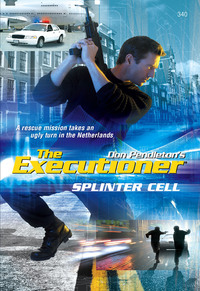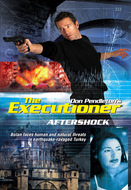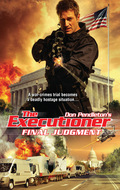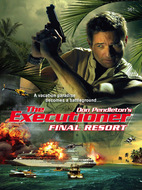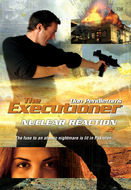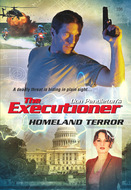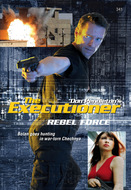Kitap dosya olarak indirilemez ancak uygulamamız üzerinden veya online olarak web sitemizden okunabilir.
Kitabı oku: «Splinter Cell»
Bolan was a split second too late
He reached out to grab the young woman’s arm just as her hand closed around the doorknob. Star had already pushed open the door and started to speak when the first round exploded from inside the hostel office.
From where he stood next to the partially opened door, the Executioner couldn’t see the gunman or any of the other men in the office. But he saw the result of the shot as it struck Star in the side of the neck and threw a fistful of flesh and blood back against the wall of the hallway.
The bullet ended Star’s words in midsentence. As to her life, Bolan had no time to find out. He was too busy kicking the door fully open and drawing the Desert Eagle from under his vest.
MACK BOLAN®
The Executioner
#265 Freedom Force
#266 Ultimate Price
#267 Invisible Invader
#268 Shattered Trust
#269 Shifting Shadows
#270 Judgment Day
#271 Cyberhunt
#272 Stealth Striker
#273 UForce
#274 Rogue Target
#275 Crossed Borders
#276 Leviathan
#277 Dirty Mission
#278 Triple Reverse
#279 Fire Wind
#280 Fear Rally
#281 Blood Stone
#282 Jungle Conflict
#283 Ring of Retaliation
#284 Devil’s Army
#285 Final Strike
#286 Armageddon Exit
#287 Rogue Warrior
#288 Arctic Blast
#289 Vendetta Force
#290 Pursued
#291 Blood Trade
#292 Savage Game
#293 Death Merchants
#294 Scorpion Rising
#295 Hostile Alliance
#296 Nuclear Game
#297 Deadly Pursuit
#298 Final Play
#299 Dangerous Encounter
#300 Warrior’s Requiem
#301 Blast Radius
#302 Shadow Search
#303 Sea of Terror
#304 Soviet Specter
#305 Point Position
#306 Mercy Mission
#307 Hard Pursuit
#308 Into the Fire
#309 Flames of Fury
#310 Killing Heat
#311 Night of the Knives
#312 Death Gamble
#313 Lockdown
#314 Lethal Payload
#315 Agent of Peril
#316 Poison Justice
#317 Hour of Judgment
#318 Code of Resistance
#319 Entry Point
#320 Exit Code
#321 Suicide Highway
#322 Time Bomb
#323 Soft Target
#324 Terminal Zone
#325 Edge of Hell
#326 Blood Tide
#327 Serpent’s Lair
#328 Triangle of Terror
#329 Hostile Crossing
#330 Dual Action
#331 Assault Force
#332 Slaughter House
#333 Aftershock
#334 Jungle Justice
#335 Blood Vector
#336 Homeland Terror
#337 Tropic Blast
#338 Nuclear Reaction
#339 Deadly Contact
#340 Splinter Cell
The Executioner®
Splinter Cell
Don Pendleton

It is even better to act quickly and err than to hesitate until the time of action is past.
—Carl von Clausewitz, 1780–1831
On War
There is a time to contemplate and a time to take action. I am a man of action.
—Mack Bolan
THE MACK BOLAN LEGEND
Nothing less than a war could have fashioned the destiny of the man called Mack Bolan. Bolan earned the Executioner title in the jungle hell of Vietnam.
But this soldier also wore another name—Sergeant Mercy. He was so tagged because of the compassion he showed to wounded comrades-in-arms and Vietnamese civilians.
Mack Bolan’s second tour of duty ended prematurely when he was given emergency leave to return home and bury his family, victims of the Mob. Then he declared a one-man war against the Mafia.
He confronted the Families head-on from coast to coast, and soon a hope of victory began to appear. But Bolan had broken society’s every rule. That same society started gunning for this elusive warrior—to no avail.
So Bolan was offered amnesty to work within the system against terrorism. This time, as an employee of Uncle Sam, Bolan became Colonel John Phoenix. With a command center at Stony Man Farm in Virginia, he and his new allies—Able Team and Phoenix Force—waged relentless war on a new adversary: the KGB.
But when his one true love, April Rose, died at the hands of the Soviet terror machine, Bolan severed all ties with Establishment authority.
Now, after a lengthy lone-wolf struggle and much soul-searching, the Executioner has agreed to enter an “arm’s-length” alliance with his government once more, reserving the right to pursue personal missions in his Everlasting War.
Contents
Prologue
Chapter 1
Chapter 2
Chapter 3
Chapter 4
Chapter 5
Chapter 6
Chapter 7
Chapter 8
Chapter 9
Epilogue
Prologue
The salt sea air mixed with the odor of fish grew stronger in Phil Paxton’s nostrils as he made his final walk toward the Ijsselmeer. Amsterdam was different from what he’d expected it to be. No, he thought as he stopped along the concrete railing to gaze down one of the city’s many canals, it wasn’t Amsterdam that was different.
It was his behavior within the city that had surprised him.
Phil looked at his watch. He’d be back in New York by this time the following night. He was ready to get back. Not just ready but anxious. Phil Paxton was ready to go home. He was ready to marry Janie.
Taking in a final breath of sea air, Phil turned and retraced his steps toward the hotel. But when a passing taxi slowed he suddenly found himself waving it down. He still had several hours to kill before he headed to the airport.
“Rijksmuseum,” he said as he got into the backseat.
The driver nodded, pulled away from the curb and reached forward and turned on the radio.
Phil closed his eyes and he pictured Janie as she had looked when she’d dropped him off at the airport two weeks earlier. Tears had trickled down her face, smearing her mascara and reddening her eyes. She had kissed him on the cheek rather than the mouth, then said softly, “Come back to me…if that’s what you want to do.” Then, without another word, she’d turned and walked away.
Pain seared through his heart as Phil opened his eyes again. They were passing a large park with grills set in concrete and bicycle paths. He could imagine families crowding around picnic tables, laughing, having fun, children racing about playing tag and other youthful games. He had told Janie that he had promised himself as a child that he would visit Amsterdam someday—before he got married. He had told her that he had always dreamed of visiting the Rembrandt House museum, the house where Anne Frank’s family had hidden during the Nazi occupation, the step-gabled houses, historic churches and ancient towers.
The history of the city fascinated him. But that had not been his only reason for wanting to go to Amsterdam. And even though he hadn’t told her, Janie knew it as well as he did.
The cabbie stopped at a red light, then turned right. Phil Paxton frowned. He would have sworn the Rijksmuseum was to the left. But what did he know? Maybe the cabdriver knew a shortcut. More likely, he knew a “long cut” that would increase the fare.
As the cab picked up speed, Phil closed his eyes again. Although Dutch painters and architecture had always been hobbies that bordered on passions with him, both he and Janie had known it was a very different kind of passion that had brought him to Amsterdam. Phil Paxton wanted to know for certain if he had finally settled down enough to get married. He didn’t want to marry Janie only to find himself cheating on her two weeks later. He needed to find out if he could resist temptation. And few places in the world presented temptation in the form of beautiful and available women like Amsterdam.
Phil opened his eyes and was surprised to find that they were in a section of the city he had not seen during his two weeks of furious touring. “Where are we?” he asked the driver.
The man glanced up into the rearview mirror. “Another fare to pick up,” he said. “No worry. I charge you one-half only.”
Phil shrugged. He had never liked arguing with people, especially with the additional complication of the language barrier. So he just closed his eyes again.
This time the smile that came to his face was genuine. He remembered the first night he had arrived in Amsterdam. Although he had caught a good six hours of sleep on the plane, and it had only been eight o’clock in the evening, he had convinced himself he was too tired to go looking for the fleshpots of the city. The next day he had spent several hours at the same museum toward which he was headed again now, eaten dinner at a small outdoor café, then returned to his hotel when the wine he’d drunk told him he was too woozy to get his money’s worth from any of the prostitutes who had smiled at him on the sidewalks.
The third day he had gone to the Kalverstraut—the busiest shopping area in Holland. He had surprised himself when he’d returned to the hotel later that evening, unwrapped his purchases and suddenly realized they had all been presents for Janie.
So that night he had forced himself out of the hotel even though he hadn’t wanted to go. He had made himself walk along the streets, eyeing the prostitutes who sat on display in the windows. Many were scantily clad. A few were completely nude. Without trying, he had found himself comparing each woman to Janie, and each time they came up short. Finally, he had come across a beautiful woman wearing a transparent negligee. Her long red hair fell past her shoulders and glimmered in the streetlights, and her skin was the color of milk. He had gone inside, paid the brothel owner for the entire night with her, then allowed the man to escort him to her room.
It was only after the man had shut the door on his way out, and the prostitute had let the negligee fall from her shoulders to the floor, that he had realized what had attracted him to her.
And why he could not go through with the act for which he had already paid.
The woman looked enough like Janie to be her sister.
Phil Paxton had left the room and taken a cab back to his hotel. The next day he had gone to one of Amsterdam’s more famous diamond-cutters and had a stone cut and mounted in gold, doing his best to guess at exactly what Janie would like. And for the next week and a half, art, architecture and history really had become the reason for his trip.
His eyes still closed, Phil reached into the side pocket of his sport coat and felt the small felt-covered gift box that contained both Janie’s engagement and wedding rings. In less than a day now, the engagement ring would be on her finger, and the thought made Phil’s smile widen.
His thoughts were suddenly interrupted when the driver slammed on the brakes. Phil opened his eyes to see that they were no longer on the streets but had entered a dark alleyway that stank of garbage.
Then, as if on cue, the driver turned and aimed a pistol over the seat at his passenger. “Don’t move,” he said in a completely different accent than he had used earlier. “Or I’ll kill you here and now.”
A second later, white lights from outside the vehicle flooded the interior. Phil’s door flew open and rough hands jerked him out. In a flash of vision, Phil Paxton saw rifle barrels and angry, dark-skinned faces. Then a hood was dropped over his head and tied in place around his neck with rope. Next he felt a hypodermic needle prick the skin on his upper arm.
A moment later, euphoria overcame Phil Paxton. For a moment, he knew that whatever was happening had to be just fine. Everything would work out.
The euphoria, however, was short-lived. A few seconds later, he lost consciousness.
1
Only a highly trained soldier, cop or intelligence officer would have been likely to notice the differences. Tiny differences, like the fact that his bearing was slightly more erect, that he exuded more confidence than the average man. Or that the set of his jaw was a little firmer. But it was his eyes, he knew, that would have really given him away had he not taken great pains to keep anyone from staring into them. In those eyes other warriors could see that he’d seen hell, and lived to tell about it.
On the surface, however, Mack Bolan looked little different than any of the other men flying first class from New York. He wore a well-tailored gray pin-striped suit much like bankers, gem dealers and other businessmen wore when visiting Amsterdam. His passport claimed his name was Matt Cooper instead of Mack Bolan, or the more mysterious, and descriptive, appellation by which he was also known—the Executioner.
Bolan shifted slightly in his seat. He had felt tension in the air aboard the 747 ever since boarding. He had sensed that something was wrong ever since the plane had left the runway. Who knows how he knew—he just did.
The soldier leaned back against his seat and glanced to the man at his side, next to the window. The danger that filled the air was not coming from John “Brick” Paxton. Paxton had boarded the flight with the Executioner as his confederate rather than an adversary. Granted, accompanying Bolan had not been the former Army Ranger’s idea; Paxton had made plans to rescue his younger brother, Phil, on his own. Just prior to boarding an earlier flight to the Netherlands, he’d been detained by representatives of Stony Man Farm, America’s top-secret counterterrorist organization. The Farm’s operatives had whisked Paxton away to a secluded safehouse while a secret meeting took place at the White House.
Bolan had been present at that meeting.
“There’s no way to stop Brick Paxton from going after his brother short of throwing him in jail,” the President told Hal Brognola, Stony Man Farm’s director, as well as a high-ranking official at the Justice Department. “And I’m going to look like hell in the press if I jail a guy who’s won two Silver Stars and is currently up for the Medal of Honor for his actions in Afghanistan and Iraq.”
The Executioner watched as the Man nodded his way before concluding with, “So the best thing we can do is let him go after his brother. But I want Bolan with him.”
Brognola nodded his agreement. “And I’d suggest sending them immediately, Mr. President,” he said. “All of our intelligence at the moment indicates that the terrorists picked Phil Paxton at random, just because he was American. But sooner or later, they’re going to find out just what a prize they’ve stumbled on to.”
None of the three men had thought it necessary to further identify that “prize.” They were all fully aware that Brick Paxton’s younger brother was one of America’s top nuclear engineers.
And a man who could build nukes for America could be forced to build them for America’s enemies, as well.
The Executioner glanced out of the corner of his eye, studying Brick Paxton’s face while he continued to review the past few hours in his mind. The Army Ranger’s eyes were closed, but it was impossible to tell if he was asleep or not. He’d been against going with Bolan from the moment the idea had been presented to him, and had only agreed when it had finally become clear that the President would find a jail cell for him somewhere if he didn’t.
Bolan turned back to the seat in front of him. The chain of command still wasn’t fully clear in Paxton’s mind. That might become a problem sooner or later. But the problem on the Executioner’s mind at the moment came from somewhere else on the 747.
Dinner had been served aboard the plane a half hour earlier, and the remnants were still on the first-class passengers’ trays. Lifting his plastic beverage glass, Bolan drained the contents, then he took the plastic fork and spoon from the table in front of him with his other hand and dropped them into the inside pocket of his jacket.
The ice at the bottom of his drink rattled as Bolan set the glass back down in the circular depression on the tray.
The flight attendant came quickly to his side. “Another Seven-Up, sir?” she asked with a suggestive smile. Her name tag read Margie.
Bolan’s return smile was noncommittal. “No, thanks,” he said. “I’m fine.”
“And your friend?” Margie added.
Brick Paxton’s eyes opened at the cue. “Sure. One more can’t hurt.”
Bolan sat quietly as Margie turned and disappeared into the galley between first class and the pilot’s cabin. He had studied Brick Paxton’s U.S. Army personnel file the day before and, among other things, learned that Paxton had a penchant for the bourbon. But nothing in the file suggested that he couldn’t control his drinking, or ever drank to excess.
The flight attendant returned with another miniature bottle and a fresh glass of ice water. Placing them in front of Paxton, she removed the dinner trays in front of both men and disappeared into the galley once more.
Approximately fifteen minutes later, the man sitting directly across the aisle from Bolan unbuckled his seat belt and stood up. He had the dark skin and sharp features of a Middle Easterner. He reached up and opened the overhead storage compartment, then pulled down a black attaché case before closing the compartment.
Bolan had pinpointed the source of the tension that filled the air of the 747’s first-class cabin. He watched the man out of the corner of his eye. It was not his race—the Executioner had worked with many men of Arabic origin in the past and knew that, as held true with any people, the good Arabs far outnumbered the bad. Nor was it the dark-skinned man’s manner of dress that now caught Bolan’s attention. It was not even the look in the man’s eyes as he glanced quickly at Bolan before sitting down again, the attaché case on his lap.
Still, Bolan suddenly knew.
Bolan glanced over his shoulder. The curtain between first class and coach was drawn, but through the opening he could see that three other men—all looking to be of Middle Eastern origin like the man across from him—stood in the aisle. They had also opened the overhead storage compartments, and the Executioner watched as each pulled down a black attaché case identical to the one now in the lap of the man across from him.
Bolan felt his abdominal muscles tighten in anticipation. Four men. Four identical black attaché cases.
It was far too much to be coincidence.
The Executioner glanced to Paxton. The former Ranger had just unscrewed the lid from his plastic shot bottle. But he had noted the man across from them, too, and while he couldn’t see into the rear of the plane from his window seat, he’d caught the expression on Bolan’s face.
“How many more?” Paxton whispered as he screwed the cap back onto his bottle of Wild Turkey and dropped it into the front pocket of his navy blue blazer.
“Three,” the Executioner murmured. “All in coach. Same cases.”
Brick Paxton nodded. He flipped his tray back up and out of the way into the seat in front of him, then began untying his right shoe.
The Executioner didn’t have to ask what he was doing.
Bolan reached inside his jacket and felt his fingertips touch the tops of the plastic fork and spoon he had placed there earlier. He would have preferred to have his usual weapons—the Beretta 93-R and .44 Magnum Desert Eagle—but that had not been possible. Knowing that the enemy he would face once he reached Amsterdam closely watched incoming private flights, he and Paxton had chosen to fly commercial and were, therefore, unarmed.
At least conventionally unarmed. A man like the Executioner was never completely without weapons.
Leaving the plastic fork where it was, Bolan withdrew the spoon. Glancing casually across the aisle to make sure the man with the attaché case wasn’t watching, he saw that sweat had broken out on the man’s forehead. Dropping his hands beneath the table still in front of him, the Executioner twisted the head of the spoon until it broke off at a sharp angle. Discarding the rounded dipper end, he replaced the now sharp piece of plastic in his jacket.
By now Paxton had removed his right sock. Retrieving the Wild Turkey bottle from his blazer pocket, he dropped it into the sock and tied a knot just above the small container.
Bolan folded his tray back up and pulled one of the in-flight magazines from the holder in front of him. Starting at the binding, he began rolling the periodical into the tightest tube he could fashion. Every few seconds, he used his peripheral vision to check on the man across the aisle. But the man with the attaché case was paying him no attention. He was far too engrossed in his own thoughts, and what he was about to do.
When the Executioner had finished rolling the magazine up, it was almost as hard as a length of wood. Pulling a pair of rubber bands from his pocket, he twisted them around the ends of the homemade bludgeon to keep the pages in place, then hid the club in the other inside pocket of his jacket, across from the fork and broken spoon.
Paxton’s makeshift sap was finished, too, and the Army Ranger glanced across the aisle before slapping the sock-covered bottle into the palm of his opposite hand. Satisfied, he tied his shoe back onto his bare foot.
“We don’t know what’s in the attaché cases yet,” Bolan whispered. “Maybe guns. Maybe a bomb. Maybe both.” He let out a breath. “Our only chance is to get the jump on them.”
“And if they turn out to be just four Arabic businessmen who happen to have the same kind of briefcases?” Paxton asked.
“We’ll apologize,” Bolan said. “And offer to pay the hospital bill for them.”
Paxton chuckled, low and deep. “That’s not going to be the case, though, is it,” he said in a tone of voice that made his words a statement rather than a question.
“No,” the Executioner said. He unbuckled his seat belt. “I’m heading to the coach cabin. You concentrate on the man here in first class.”
Paxton’s eyebrows lowered. “You’re gonna take out three of them?” he said. “No, I’ll go with you. We’ll get those three, then—”
“We don’t have time to argue,” Bolan ordered. “If we’re both in the back, and this clown across from us has a bomb, he’s only a few steps from the pilot. And he’ll get plenty of warning if there’s a scuffle behind him.”
Paxton saw the logic in the Executioner’s plan. He nodded.
Bolan stood up. The man with the attaché case had glanced at his watch twice before Bolan could even turn down the aisle away from the cabin.
Whatever the four men were planning was about to go down. Soon.
The flight attendant seemed to appear from nowhere as Bolan stepped through the door from first class to coach. “Oh, sir,” Margie said, bumping into him. “I’m sorry.”
“No problem,” said the Executioner, and started to step around her.
“Sir, where are you going?”
“Restroom,” Bolan said, again trying to step to the side in the narrow aisle.
“But there’s a much better one in first class,” Margie said.
“It’s taken,” Bolan said. Beyond the flight attendant, he saw sweat and tension on the faces of the other three men who had pulled the attaché cases down from the overhead compartments. As the nervous man in first class had done, they all glanced at their wristwatches.
Then three hands moved to the latches on the cases.
Bolan shoved Margie to the side and sprinted down the aisle. Whatever was about to happen was no longer about to happen soon.
It was happening now.
THE THREE Arabs all looked up at the big man running toward them, and Bolan was reminded that the almost supernatural sense of danger was never limited to the good guys. Criminals, terrorists and other miscreants developed it just like good soldiers, cops and other warriors.
A glint of fire suddenly appeared in the eyes of the three men. They stood up as they opened their cases.
Bolan continued to run down the aisle past the curious faces of the other passengers. He still didn’t know what was in the black attaché cases. But it was a good bet that it would be either guns, bombs or both. Neither did he know how the terrorists had gotten the cases past security and on board the plane.
But that hardly mattered now. The reality of the situation was that they had gotten the cases onto the plane, and he would have to deal with that reality as it stood. If guns were their only weapons, he stood a good chance of saving the hundreds of people on board the 747. But if there were four bombs on the plane, not even the Executioner would be able to get to them all before at least one was detonated.
Bolan didn’t break stride as he drew the broken plastic spoon from his pocket and drove the sharp point into the dark-skinned throat above the SIG-Sauer pistol his adversary had pulled from the attaché case. A chortling sound issued forth with the blood that shot out of the man’s jugular vein, staining his white shirt and beige suit. The Executioner reached out, grabbing for the SIG-Sauer.
He was a split second too late.
Waving his arms wildly in the throes of death, the would-be gunman released the SIG. It flew out over the passengers and fell somewhere behind Bolan.
The black attaché case dropped to the deck of the plane, open. Two shirts and a pair of slacks flew out from between the sides. But no bomb.
The terrorist in the beige suit fell to the floor on top of the mess.
Bolan leaped over the still-convulsing body and continued down the aisle, jerking the tightly wrapped magazine from inside his jacket as he ran. By now, the second man—wearing a light blue suit and darker blue necktie—had pulled a Glock from his attaché case. His hand shook nervously as he tried to steady his aim on the Executioner.
Bolan ducked low, praying that like most nervous men, the would-be hijacker would shoot high. Not just high enough to miss him, but high enough to miss all of the seated passengers as well.
His prayer was answered.
The Glock exploded with an almost deafening roar in the tight confines of the cabin. More screams threatened to burst the Executioner’s eardrums. But Bolan could tell by the angle of the barrel that the shot had gone to the ceiling and exited the plane. The hole it made was far too small to affect the cabin pressure. But too many of the passengers had seen movies where such tiny openings sucked everyone out into the sky, and more panicky screams added to the chaos around Bolan.
Bolan didn’t give the man with the Glock a second chance. With a sudden leap, he reached the terrorist and swung the rolled magazine like a short billy club. The hardened pages caught the man in the Adam’s apple and crushed his larynx. Bolan followed through with a left hook, connecting with the man’s temple with the force of a jackhammer.
The Glock fell to the seat behind the terrorist. The man’s lifeless body began to fall backward on top of it.
Bolan reached out, grabbing the second terrorist by the shoulders and throwing him to the other side of the aisle, out of the way. But when he looked down to the seat for the Glock, it was gone.
But the Executioner had no time to waste. Rather than go searching for the Glock, the Executioner continued down the aisle until the final terrorist in coach class shouted in heavily accented English, “Halt! Stop now, or I will blow up the plane!”
Still a good twenty feet from the man, Bolan could see the arrogant smile on his face. He wore a black suit with light pin-stripes. He had opened his attaché case and turned it to face the Executioner.
Bolan stared into the open case. This man had no pistol for him to worry about.
What he did have, however, was a bomb.
The Executioner stood motionless as the terrorist had ordered. “What is it you want?”
“First,” the man with the bomb said sarcastically, “is for all of these swine to…shut up!” He shouted the last two words at the top of his lungs. And they had the desired effect. The last of the screaming, moaning and crying turned to an eerie silence as the passengers quieted, frozen in fear.
“All right,” Bolan said, standing upright in the center of the aisle. “You got your first wish. Now what?” He stared into the open attaché case, trying to make out the details of the bomb under the shadows created by the lid. He couldn’t be sure but it looked as if the case contained a substantial amount of plastic explosive—probably Semtex. The shiny, polished steel of what had to be a detonator flashed at him. The item most easy to see and recognize was a common digital kitchen timer.
There didn’t look to be anything high-tech about the explosive device. It was simple. Very simple.
But still lethal.
Satisfied that Bolan had seen what was in the case, the terrorist in the black suit now closed it partway but kept his left hand inside.
The Executioner gauged the distance between him and the terrorist. If he had judged the design of the bomb correctly during the second or so he’d been allowed to view it, it should be easy enough to defuse. If he could get to it before the man in the black suit set it off.
But that wasn’t likely. The same simplicity that made it easy to neutralize also made it easy and fast to detonate. The timer was electronic, and made no ticking sound. So it was impossible to determine if it had been set or not. But that made little difference, either. All it would take to override the timing device would be to touch two wires together, and Bolan could see by the way the terrorist’s hand was positioned that he held one of those wires inside the half-closed case even now.
The man with the bomb had not replied to Bolan’s question, so the Executioner repeated it. “What do you want now?” he said in a louder voice.
“I want you to sit down,” said the dark-featured man.
“This has got to be a give-and-take negotiation,” Bolan said, speaking for all of the passengers. “What do we get in return?” Bolan asked, playing for time.
He continued to stare the terrorist in the eye. If he was to have any chance at all of reaching the attaché case before the bomb went off, he needed the terrorist in the black suit to be distracted in as many ways as possible.
Ücretsiz ön izlemeyi tamamladınız.
